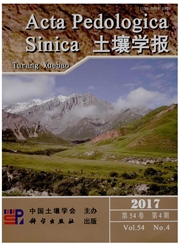

 中文摘要:
中文摘要:
采用14C示踪技术,通过100 d的原状土柱室内模拟试验,得出以下研究结果:培养100 d后,有34.74%(水田覆盖)、17.85%(水田翻埋)、35.68%(旱地覆盖)和36.06%(旱地翻埋)的稻草碳被矿化,水田和旱地土壤分别有0.99%~1.17%和2.25%~2.53%的原有有机碳被矿化。土地利用和稻草还田方式及两因素的交互作用,对添加稻草碳的矿化速率和累积矿化率均有显著影响(p〈0.01),但对于土壤原有有机碳的矿化速率和累积矿化量,只有土地利用方式对其有显著影响(p〈0.01);添加稻草后,土壤总累积矿化量没有发生显著变化(旱地翻埋除外),因为稻草还田抑制了土壤原有有机碳的降解,使100 d的累积矿化量相对于各自对照减少了13.95%(水田覆盖)、15.68%(水田翻埋)、11.04%(旱地覆盖)和3.34%(旱地翻埋)。水田翻埋和旱地覆盖是稻草资源合理利用的较好方式,更有利于土壤有机碳的积累;添加的稻草碳和土壤原有有机碳在水田的矿化速率均显著低于旱地,是水田有机碳含量通常高于同一景观单元旱地的主要原因之一。
 英文摘要:
英文摘要:
To improve the farmland soil fertility and provide suggestions for better field management for more carbon sequestration,effects of land use and rice straw incorporation models on mineralization of soil organic carbon were quantitatively investigated.The CO2-C evolved from the soil was measured during incubation of the undisturbed soil column mulched or incorporated with 14C labeled rice straw over a 100-day period.Results show that straw carbon participated in carbon mineralization,contributing 34.74% in paddy mulched with straw(SM),17.85% in paddy incorporated with straw(SI),35.68% in upland(SM) and 36.06% in upland(SI) of the 14C-labelled rice straw carbon applied in either way after 100 d incubation.Meanwhile,0.99%~1.17% and 2.25%~2.53% of the native soil organic carbon(SOC) in the paddy and upland soil was mineralized,respectively.Rice straw application model and land use and their interaction all showed significant effects on mineralization rate and accumulative mineralization rate of applied rice straw carbon(p0.01).However,only land use(p0.01) did on mineralization rate of SOC and accumulative mineralization rate of SOC.Application of rice straw did not affect much the total soil accumulative carbon mineralization rate except in upland(SI) because straw in the soil inhibited decomposition of native SOC,thus reducing the 100d cumulative mineralization rate by 13.95% in paddy(SM),15.68% in paddy(SI),11.04% in upland(SM) and 3.34% in upland(SI).Comparatively,Straw incorporation in paddy fields and straw mulch in upland fields are better straw application models and more favorable to accumulation of SOC.The mineralization rate of either applied rice straw carbon or native SOC in paddy soil is obviously lower in paddy soil than in upland soil,which is one of the main reasons why the content of soil organic carbon is generally higher in paddy soil than in upland soil within the same landscape.
 同期刊论文项目
同期刊论文项目
 同项目期刊论文
同项目期刊论文
 期刊信息
期刊信息
